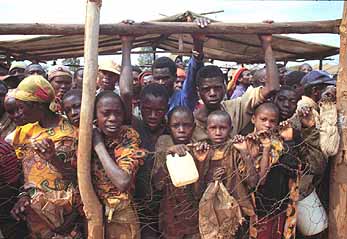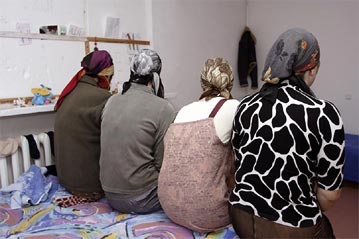Lubbers visits Chechen refugees in an effort to draw attention to their plight
Lubbers visits Chechen refugees in an effort to draw attention to their plight

Refugees from Burundi and Rwanda at a camp in Tanzania.
MOSCOW, Jan. 16 (UNHCR) - In an effort to draw renewed attention to their plight, High Commissioner Ruud Lubbers Wednesday visited tent camps and refugees from war-ravaged Chechnya on the second day of a three-day visit to the Russian Federation.
Lubbers flew from Moscow to the southern Russian republic of Ingushetia, home to 150,000 refugees from neighbouring Chechnya. An additional 160,000 people are displaced within Chechnya itself.
"One of the reasons he's going is to put Chechnya back on the map," a UNHCR spokesman, Kris Janowski, said in Geneva ahead of the High Commissioner's visit.
The visit, Lubbers' first trip to Russia since he became High Commissioner one year ago, focused on the protection of refugees in Russia and the link between asylum and migration in the country.
"Our main request to Russia is that these people not be pushed back to Chechnya, which would be a huge security risk," Kris Janowski, a UNHCR spokesman, told a news briefing in Geneva Tuesday. "We want them to be able to stay in Ingushetia even though the situation there is not ideal."
"We think the Russian authorities share our position that Chechnya is not safe enough for people to go back," Janowski said.
On Tuesday Chechen refugees complained to a Council of Europe parliamentary delegation of poor food and living conditions in a tent city at Bart near Nazran, Ingushetia's major city, where the most of the refugees live.
Many of the displaced Chechens are spending their third winter in Ingushetia, with 15 percent of them living in tent camps, 21 percent in so-called spontaneous settlements such as converted farm or industrial buildings, and the remaining 64 percent with host families or in private accommodations.
Although UNHCR does not operate in Chechnya itself, it assists the displaced Chechens through legal and psychological counselling centres, provides shelter materials, and improves water and sanitation facilities in the tent cities.
Russia currently hosts about 21,000 recognised refugees and has integrated some 210,000 others from the former Soviet republics that now make up the Commonwealth of Independent States, according to UNHCR. In addition, some 6,000 persons have registered with the agency for asylum status in Russia.









